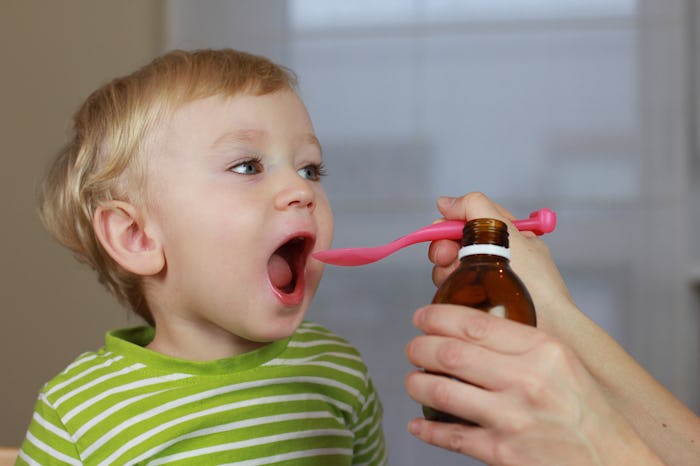Life
Kids Are Still Getting Opioid Prescriptions, Despite Apparent Dangers & FDA Warning
No one likes to see their child in pain, but proper pain maintenance in children is a complicated problem to solve. One factor is that medicines that work well for adults aren't always appropriate for kids. Another is that, according to new research, doctors are still prescribing kids an opioid pain reliever, despite warnings from the Food and Drug Administration that it's not safe for little ones to consume. Yes, medical professionals have struggled to find the best way to treat post-surgical pain in children, but they are making progress in limiting dangerous options.
After finding it to be unsafe, the FDA began requiring a black box warning on codeine prescriptions issued to children. Following this requirement, codeine prescriptions for kids following tonsil and adenoid removal surgeries have drastically reduced, but they are still not at zero, according to CNN. Some children are still being prescribed codeine, and other opioid prescriptions for kids have been on the rise since the black box mandate as well.
CNN reported that between 2010 and 2015, doctors from the American Academy of Pediatrics gathered information on more than 350,000 children who have undergone tonsil or adenoid surgery, monitoring their prescriptions for codeine and other opioids. Codeine was found to have dangerous effects on children, including severe breathing trouble and even death — 24 deaths to be exact — between January 1969 and May 2015. The black box warning was put into place in 2012.
Dr. Kao-Ping Chua, the AAP study's lead author and assistant professor of pediatrics and communicable diseases at the University of Michigan and C.S. Mott Children's Hospital, told CNN that prescriptions of codeine have gone down:
A decreasing number of children were receiving codeine even before the FDA investigation, but once that investigation was over, there was a huge drop. That's kind of what we expect. An FDA black box warning should actually decrease inappropriate codeine prescribing.
But at the end of the study, researchers found that one in 20 children was still receiving codeine prescriptions, according to Forbes. And while 5 percent may not sound like a large number, Chua added that "tonsillectomy and adenoid removal is the second most common surgery in children." While these children do need pain management, codeine is simply not the best option for that. Chua told Forbes that finding the best option has been a struggle:
The issue of pain control has been a quandary in children, as increased pain has been associated with higher risk of dehydration, bleeding, and hospital admission.
Codeine does nothing for pain on its own, but is converted to morphine by the liver; it's in this conversion that there is a potential for danger and how fast that happens depends on the person. According to CNN, 1 to 2 percent of people are what is known as "ultra-metabolizers," meaning that they create morphine very quickly and can lead to overdose. There is no way to know if someone is an ultra-metabolizer, Chua told NPR, which means, "You're basically rolling the dice when you prescribe codeine. Codeine in general for children ought to be a zero event."
While researchers state that there are risks associated with certain drugs, there are safer alternative medicines that make codeine prescriptions to children unnecessary most of the time, such as Tylenol and ibuprofen. Chua explained to NPR:
Over- the-counter agents like that actually have been proven to be quite effective in managing pain after tonsillectomies and adenoidectomies. And they have a much better safety profile.
Ultimately, parents should be proactive in asking doctors what their over-the-counter pain management options are. While any medication shouldn't be administered without first talking to a physician, there are choices beyond codeine and other opioids.
Check out Romper's new video series, Romper's Doula Diaries:
Watch full episodes of Romper's Doula Diaries on Facebook Watch.
